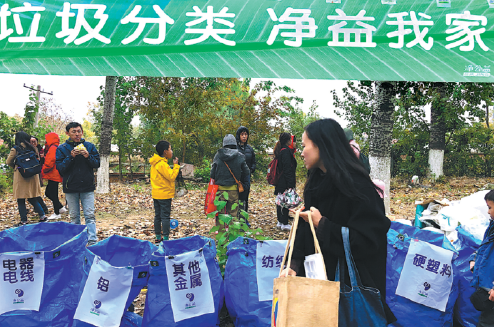Waste is bad taste as recycling steps up a gear

 Bie Shimin takes part in a public welfare activity about refuse classification in Beijing in November. CHINA DAILY
Bie Shimin takes part in a public welfare activity about refuse classification in Beijing in November. CHINA DAILY
Chance for better choices
Since the novel coronavirus outbreak, most Chinese are staying at home to curb the spread of the virus. Tian Zuning, brand and communication director of China Zero Waste Alliance, an environmental NGO, shares her ideas about how to go zero waste.
"To reduce the amount of disposable packaging, you can buy large-packaged items instead of small-sized ones packed separately, like snacks and milk," Tian says.
"You can give unwanted things to friends, sell or donate them to secondhand item platforms."
During the extraordinary circumstances, when people are encouraged to stay at home, food delivery has been resumed in big cities like Beijing, but Tian suggests that people reduce the frequency of their orders so as to decrease the physical contact with other people, as well as limit the usage of disposable boxes.
Tian suggests that people can learn or improve their cooking skills during this period.
"After forming the habit, some may bring their own lunchboxes to the office when the epidemic ends," she says.
"You can also learn to make drinks that you used to buy, like milk tea, and it's better to take your own cup when you buy it in the future."
As for disposable facial masks, she says, healthy people should disinfect them and put them in a bag, before disposing of them in a specific dustbin for masks, or to "the other waste" dustbin, if there is no such receptacle.
To avoid masks being recycled illegally, one could dye the mask with ink or cut it in half.
Use a mask based on its service life, rather than throw it away after using it only for a short time, Tian suggests.
During the outbreak, many people are working at home and have online conferences. More meetings can be held online rather than face-to-face after the epidemic ends, she says, and companies should champion the idea of zero waste, when they hold large conferences, to reduce carbon emissions.
For example, if they have to hold face-to-face conferences, they can reuse name tags on a desk and not use bottled water. They can also put stationery in a designated place for those who haven't brought a pen and paper, rather than putting a set on each seat.
Tian has become accustomed to living a low-carbon lifestyle after years of practicing a zero waste policy.
"When I purchase something, I'd first consider if it's environmentally friendly," she says, pointing out that she brings a cloth bag to shop in the food market instead of buying online to avoid over-packaging, and she picks transparent-bottled drinks over colored ones, since they are more recyclable.
"Going zero waste is a personal choice," Tian says. "You can choose the things that you can do to the best of your ability and encourage others to go zero waste as well."
Contact the writer at xulin@chinadaily.com.cn



































